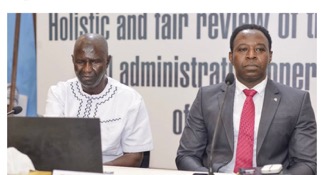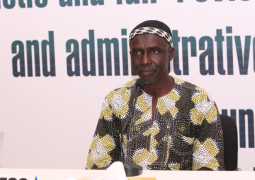
He made this revelation at the Authority’s stakeholder consultative meeting focused on vehicle procurement resolutions regarding the challenges and strategies in vehicle procurement. The meeting was held at Coco Ocean in Bijilo on Thursday.
Mr Sanyang further gave a breakdown of their approved procurements and value spent on vehicles from 2020 to 2024.
“In 2020 the value of procurements approved was D7,990,425,881.97 and D515,518,815.32 was spent on vehicle procurement.”
“In 2021, D9,294,090,299.33 was the total procurements approved and D302,639,073.20 was spent on vehicle procurement.”
“In 2022, D8,000,090,791.78 were the approved procurements and D830,459,231.00 was the value spent on vehicles.”
“In 2023, D17,192,569,233.13 was the total procurements approved and D177,025,628,00 was the value spent on vehicles.”
“This significant allocation of national resources highlights both the importance and the urgency of improving the vehicle procurement processes. However, the significant funds allocated to vehicle procurement also raise important questions about efficiency, transparency and value for money,” he pointed out.
“Despite the considerable resources spent, we continue to face issues such as the supply of substandard vehicles just as alluded to by the Director General. Some vehicles you buy them, you go to some institutions within one or two years they have problems.”
“Unavailability of spare parts for maintenance for some types of vehicles, sometimes challenges of delivery delays and even the failure of some suppliers to fulfil their contracts.”
GPPA’s Director General Phoday M. Jaiteh said: “The purpose of this stakeholder outreach and consultative meeting is to communicate, consult, engage and involve stakeholders about issues, constraints, opportunities and vehicle procurement decisions given your interest and influence in the procurement outcomes.”
“Inclusive national development and sustainable economic growth is a function of a vibrant and flourishing private sector,” he said.
“We know that to sell a vehicle, there should be authorisation from the vehicle manufacturers. We are certain that the outcome of this outreach and consultative meeting will act as a catalyst for an enabler to inform and influence government policy as regards public procurement regulation and practice in The Gambia,” he said.
“A total review of the different types of vehicles required by public institutions is essential and this includes large, medium and double cabin vehicles as well as mini buses. Clear requirements for each category will facilitate better procurement decisions and ensure that vehicles meet the specific needs of various public services,” he stated, while citing testing and quality assurance as vital.
“Ensuring that vehicles undergo rigorous testing based on established quality standards is paramount.”
“Additionally, the laboratories and institutions conducting these tests must be accredited and equipped to meet international testing standards. And last but not the least compliance with national standards.”
The meeting brought together various stakeholders, including government representatives, vehicle dealers, and procurement experts, private sectors to discuss the resolutions from their previous consultative meeting.
Read Other Articles In Headlines
UTG introduces national languages
May 11, 2021, 11:19 AM

Lawyer Camara rejects witness testifying without written statement as ‘prejudicial’
Dec 11, 2025, 12:23 PM



